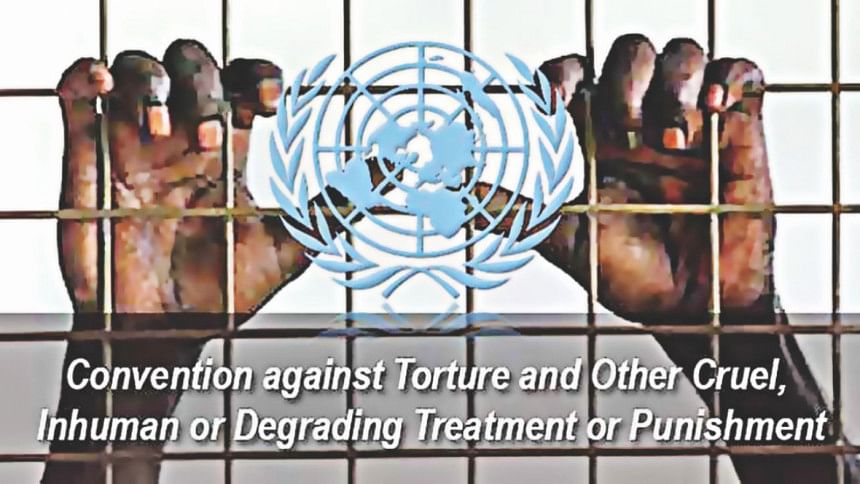Overdue state party report of Bangladesh on the UNCAT

Till now the Government of Bangladesh has not submitted its initial state report to the Committee against Torture despite the fact that Bangladesh acceded to the UN Convention against Torture and Other Cruel Inhuman or Degrading Treatment or Punishment, 1984 ('the UNCAT') twenty years ago. Under Article 19 of the UNCAT, each state party is under obligation to submit its initial report to the Committee Against Torture ('the Committee') within one year from the date of ratification or accession. According to recent information available on the OHCHR website, it appears that the Committee has finally decided to consider Bangladesh's observance of the UNCAT in its 67th Session even without its initial state party report of Bangladesh.
Bangladesh has multifold obligations under both domestic and international law to ensure protection against torture. These include, in addition to the UNCAT, the Constitution of Bangladesh [Article 35(5)], International Covenant on Civil and Political Rights (Article 7), Rome Statute of the International Criminal Court [(Article 7(1)(f) and 8(2)(a)(ii) & (c)(i)], the Four Geneva Conventions on the Protection of Victims of Armed Conflicts (Common Article 3 and the grave breaches provisions). Moreover, 'protection against torture' has been upheld as Jus Cogens on a number of occasions. Conceiving these responsibilities, Bangladesh has enacted the Torture and Custodial Death (Prevention) Act in 2013. In view of the foregoing, the Government's oversight regarding submission of its state party report to the Committee deserves some criticism.
At this juncture, it is worth mentioning that despite the Government's omission to submit its report on the UNCAT, the National Human Rights Commission ('the NHRC') of Bangladesh submitted an alternative report to the Committee on compliance by Bangladesh with the UNCAT. The said report made a critical assessment of the legal regime in force designed to address protection against torture in Bangladesh. In addition to providing a general overview of international legal framework concerning Bangladesh's obligation and commitment to prevention and punishment of torture, it specifically delineates the ambit of Bangladesh's legal obligation under the UNCAT. In a broader context, the report includes a comprehensive analysis of the domestic legal regime purporting to give effect to the provisions of the UNCAT with focus on topical issues like the legal concept of torture, measures to prevent torture, immunity from prosecution for torture, criminal jurisdiction over torture, principle of non-refoulement, extradition and torture, general and thematic issues relating to torture scenario in Bangladesh, training and education to prevent torture, forms of punishment amounting to torture, compensation to the torture victims, confessions and torture, etc. The report includes specific recommendations to fortify legal protection against torture.
However, one may notice that the aforesaid report is not available on the OHCHR website which means that the Committee at that time did not take it into consideration most probably for the reasons that either no review session was scheduled for Bangladesh or no state party report was submitted. Presumably, this is the reason why the NHRC later published the report in 2015 under the title, 'JAMAKON Report to the UN Committee against Torture.'
The fact that the report is already five-year old does not diminish its relevance entirely. In the absence of any other report of equivalent quality, the NHRC should press the Committee for taking this report into consideration during the review process. Alternatively, should time permit, the NHRC may decide to update and resubmit the report after incorporating a few features like the issue of torture victims in the judgments of the International Crimes Tribunal of Bangladesh or torture under the Rome Statute, etc.
Currently, Bangladesh is adorning the seat of the Human Rights Council for the third time. Recently, it has been selected for the post of elected to Board of Directors of ICC Trust Fund for Victims. Additionally, it is leading to many human rights causes including that of Rohingyas. Of late, it has drawn special attention of the world community with its elevation to the Middle-Income Country. In this context, Bangladesh's oversight to submit its twenty-year due State report to the 67th session of the Committee may be seen as a visible spot in its radiant international image.
THE WRITER IS AN LLM DEGREE HOLDER, GENEVA ACADEMY OF INTERNATIONAL HUMANITARIAN LAW AND HUMAN RIGHTS, SWITZERLAND.

 For all latest news, follow The Daily Star's Google News channel.
For all latest news, follow The Daily Star's Google News channel. 



Comments